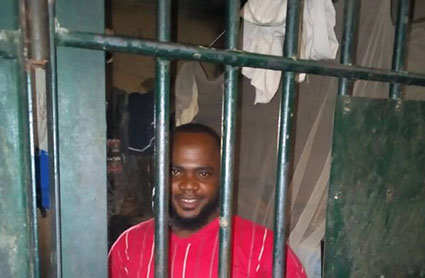by WorldTribune Staff, March 29, 2022
Risks involved in covering the news differ from place to place.
In their attempts to cover the reality on the ground in what most analysts say is a failed state, Nigeria’s journalists risk not only imprisonment from the government but violent attacks by terrorists and criminal organizations who are running rampant in Africa’s most populous nation.

“Nigeria is fast becoming a hostile environment for press freedom,” Yakubu Bawa, chairman of the Nigerian Bar Association in Plateau state, told The Epoch Times in a March 28 report. “That this is happening in a democratic dispensation is unacceptable.”
More than 500 reporters and media workers have suffered “disturbing” violations under President Muhammadu Buhari, according to a joint report by Media Foundation for West Africa (MFWA) in collaboration with the Nigerian Union of Journalists (NUJ), Open Society Initiative for West Africa (OSIWA) and Hewlett Foundation.
On Feb. 28, the United States issued a travel advisory, warning anyone going to Nigeria to reconsider due to crime, terrorism, civil unrest, kidnapping, and maritime crime.
Eight reporters have been murdered since Buhari came to power in 2015, and half of the deaths were never investigated, according to Sahara Reporters.
Broadcast stations also have been sanctioned for breaching the country’s controversial broadcasting codes, local reporters told The Epoch Times.
The National Broadcasting Commission (NBC) — Nigeria’s broadcast regulatory agency on Jan. 5 fined a local private radio station, Vision FM, 5 million Nigerian Naira ($12,026) for criticizing the government’s handling of security. More than 80 stations have been sanctioned by the commission in recent years.
The risk to reporters may be greatest in Kaduna in Nigeria’s north-central region, reported The Epoch Times, which saw one of its contributors in the region arrested.
Flush Fake Media: Revive the American Free Press
Jonathan Asake, president of Southern Kaduna Peoples Union. (Courtesy of Jonathan Asake)
“There is a total clampdown of journalists in Kaduna state,” Jonathan Asake, the president of the Southern Kaduna Peoples Union (SOKAPU) told The Epoch Times. “Make an attempt to report any incident and be arrested. That is why journalists see these attacks and displacements and a lot of time they are not courageous enough to report them.”
The Epoch Times noted that one of its contributors in Kaduna, Luka Binniyat, “was jailed for reporting terrorist attacks that drew the umbrage of high officials.”
Binniyat was arrested by Kaduna police on Nov. 6, 2021, on charges of defamation of character and injurious falsehood, which were later changed to “cyber-stalking.”
Binniyat had reported on a massacre in Madamai, Kaduna, during the summer that was published on Oct. 29 in The Epoch Times. The story quoted local lawmakers that contradicted the claims of Kaduna officials regarding the attack.
Freelance journalist Steven Kefason ran afoul of Nigerian authorities in Kajuru, in Kaduna, in 2019 after he had re-posted images from the county chairman’s own Facebook page.
Kefason, who also faced the charge of “cyber-stalking,” spent several months in prison awaiting a magistrate to grant him bail. His social media footprint was wiped out.
“Both Kefason and Binniyat are still waiting for the courts to finish trying their cases, with the result that they are constantly under threat of re-arrest,” The Epoch Times noted.
Although Kefason writes articles from undisclosed locations since getting out of prison, he got a threatening phone call on Feb. 7.
“The caller said he will track me down,” said Kefason, who added that he got a death threat in an unsigned letter last year.
The handwritten letter obtained by The Epoch Times accused Kefason and a local pastor, Gideon Mutum, of insulting the Fulani tribe in his reports.
The Fulani has more than 20 million members in Nigeria and has been blamed for thousands of murders in the country.
“We have not forgotten your [reports] in the media about us [Fulani],” the letter says, “You have insulted the Fulani for long and don’t think you will escape this time.”
Efforts to punish journalists such as Binniyat and Kefason drew a rebuke from
“Northern Nigeria gives a whole new meaning to ‘cancel culture,’ ” human rights attorney Nina Shea, a scholar at the Hudson Institute in Washington, D.C. told The Epoch Times. “To report the facts of Fulani atrocities against defenseless citizens, journalists and witnesses brave threats of violence, death, and imprisonment, not only de-platforming.”
“Moreover, it’s clear from this assault on the free press that certain high-level government officials and security forces are collaborating with Fulani militants and terrorists in the silencing of reporters. That these two sectors are jointly trying to hide the facts of continuing mass killings and mayhem by one ethno-religious group against others is strong support for the argument that a genocide is unfolding—with government approval, if not active involvement,” Shea wrote.
About . . . . Intelligence . . . . Membership
